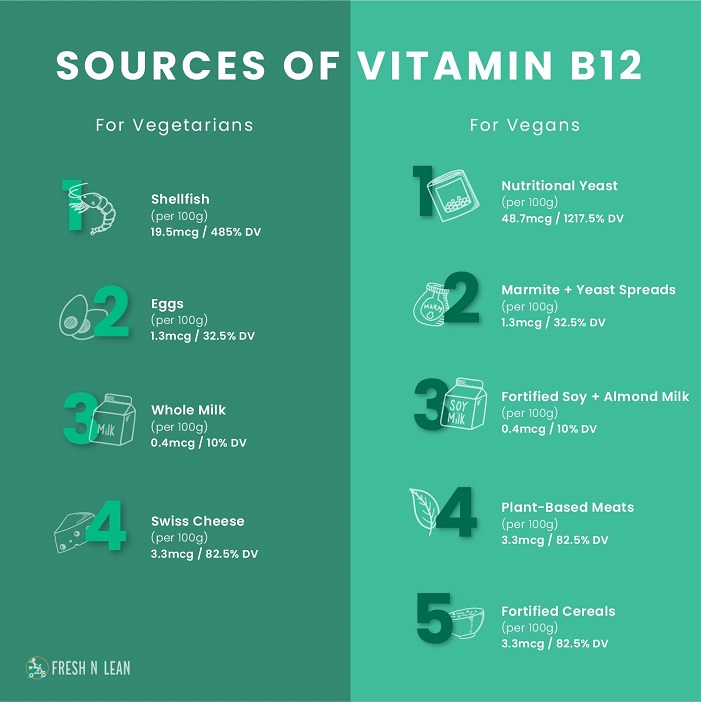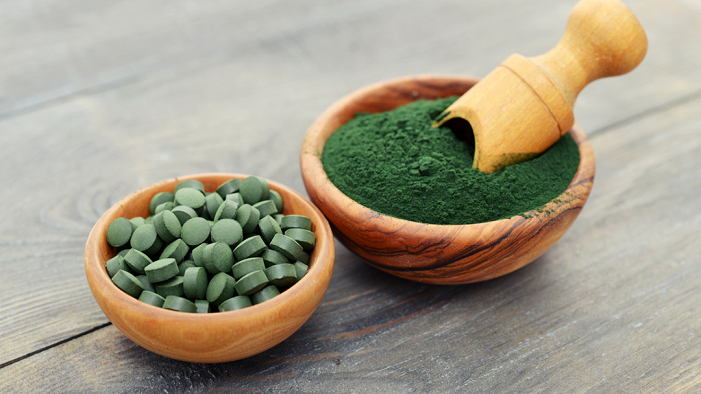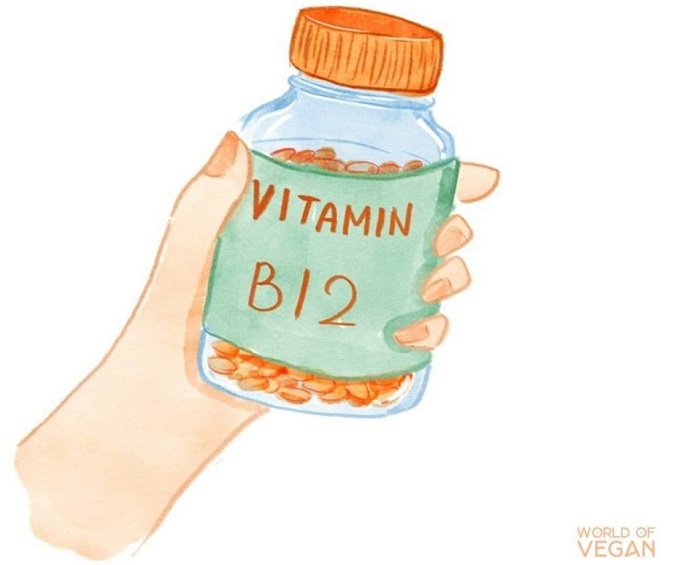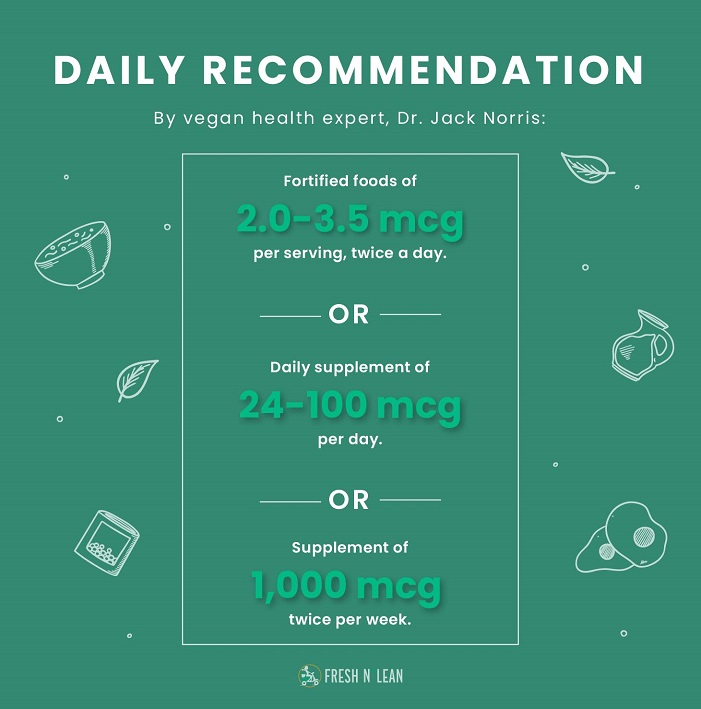How To Get B12 As A Vegan
SUMMARY
A vegan diet boasts a long list of benefits, but there's one key micronutrient you may be missing out on: B12. Here's the lowdown on vegan B-12 sources, along with tips on how to make sure you're getting enough.
Fresh N' Lean is the nation's largest organic meal delivery service. Our tasty, chef-prepared cuisine is always fresh and never frozen, and we offer five convenient meal plans: Protein+, Keto, Paleo, Standard Vegan and Low-Carb Vegan. Choose Fresh N' Lean for affordable nutrition, delivered to your doorstep.
Vitamin B12: It's arguably one of the most important micronutrients on the face of the planet, involved in the metabolism of every single cell in your body.
The scary truth?
If we don't actively stay on top of our B12 consumption, it turns out a deficiency is a very real threat (and the consequences can be pretty dire). This is especially the case if you're doing your bit for the planet and consuming a plant-based diet, with studies showing that up to 92% of vegans may be deficient…
But fear not:
You don't have to swap your chickpeas for chicken just yet. There's still plenty of things you can do to stay on top of your vegan B12 and remain a healthy herbivore. Today we're going to explore how to get B12 as a vegan, and some of the best natural sources.
Let's take a look!
SUMMARY
Vegan Sources of Vitamin B12:
1. Nutritional Yeast
2. Marmite + Yeast Spreads
3. Fortified Soy + Almond Milk
4. Plant-Based Meats
5. Fortified Cereals
6. Tempeh
7. Chlorella
8. Nori Seaweed
9. Cremini Mushrooms
Vitamin B12: The Quick Facts

What is Vitamin B12?
Fun fact time:
- Vitamin B12 is one of eight B-vitamins.
- It's water soluble and is structurally the largest vitamin we know of.
- We absorb B12 in the gut with the assistance of a protein called Intrinsic Factor.
Where Does B12 Come From?
The most common dietary sources of B12 consumed around the world are animal products such as meat, dairy, seafood, and eggs. But B12 isn't necessarily produced by the animals per se… Many people don't realize that B12 is actually synthesized by certain bacteria and archaea.
We humans actually produce our own B12 from bacteria in the colon, but in a cruel twist of fate, it's too far down in thfre digestive tract for us to absorb any!
How Much B12 Do We Actually Need?
It's a super common question – how much vitamin B12 per day do we actually need? The current recommendations from the National Institute of Health are as follows:
| Age | Male | Female | Pregnancy | Lactation |
| 0–6 months* | 0.4 mcg | 0.4 mcg | ||
| 7–12 months* | 0.5 mcg | 0.5 mcg | ||
| 1–3 years | 0.9 mcg | 0.9 mcg | ||
| 4–8 years | 1.2 mcg | 1.2 mcg | ||
| 9–13 years | 1.8 mcg | 1.8 mcg | ||
| 14+ years | 2.4 mcg | 2.4 mcg | 2.6 mcg | 2.8 mcg |
The values above are based in the USDA daily guidelines. However, in 2015, the European Food Safety Authority established a new 'adequate intake' of 4μg (microgram) per day for the general population.
If you're concerned that your B12 levels may be less than ideal, there are various ways to measure B12 levels for vegans. We could go down a rabbit hole with B12 testing, but instead, the guys at Vegan Health put together a great summary:
"It is prudent for people to routinely have their homocysteine levels tested every 5 years after age 45. But unless you suspect a B12 absorption or metabolic problem, there is no reason to get MMA (Methylmalonic Acid) or B12 levels tested if you follow the recommendations (hitting the daily intakes above)."
In short – make sure you're getting enough B12 through your diet or supplements, and be sure to go to a doctor and get tested if you suspect you may be running low.
What Does B12 Do? Why Do Vegans Need B12?
Vitamin B12 is involved with a long list of important chemical and metabolic processes in the body – red blood cell production, DNA synthesis, nervous system function, and energy metabolism just to name a few.
Maintaining adequate B12 levels also helps to prevent anemia (a lack of healthy red blood cells) and various neurological issues – both of which can have serious health implications.
As we touched on above, vegans need to pay particular attention to their B12 levels because the micronutrient is mainly found in animal foods.
Vegan B12 Deficiency and Symptoms:
If you follow a plant-based diet, it makes sense to be a little concerned about getting enough B12. After all, B12 is one of the most common vegan vitamin deficiencies. But it's not just herbivores who should be mindful of their intake:
According to The National Institute of Health, older people, those with atrophic gastritis (thinning of the stomach lining), pernicious anemia, and other gut issues like Crohn's and Celiac disease may also be at an increased risk.
Some of the key signs and symptoms of a B12 deficiency to look out for may include:
- Strange sensations, numbness, or tingling in the hands, legs, or feet
- Difficulty walking (staggering, balance problems)
- Anemia
- A swollen, inflamed tongue
- Difficulty thinking and reasoning (cognitive difficulties), or memory loss
- Weakness and fatigue
Source: Harvard Health
Vegan & Vegetarian Sources of Vitamin B12
So if you're looking to maintain healthy B12 status when on a plant-based diet, what are your best options? Let's take a look.

Keep in mind:
The percentage of DV listed is based on the European Food Safety Authority adequate intake' of 4μg. Your actual values may need to be adjusted based on your age and various other factors.
Vegetarian B12 Sources
Typically it's a fairly simple process to source vitamin B12 foods for vegetarians, as the diet allows for the consumption of some animal products.
This explains why a vegetarian B12 deficiency is less common than a vegan deficiency. That being said, it's still important to make sure you're covering your bases:
1. Shellfish
19.5mcg / 485% DV per 100g
Shellfish are some of the most dense natural sources of B12 on the planet, as well as being rich in other important micronutrients like omega-3s, zinc, and iron.
Although they're not strictly plant-based, some vegetarians choose to consume them as they have no central nervous system (the shellfish, not the people).
2. Eggs
1.3mcg / 32.5% DV per 100g
As well as being a super source of B12, eggs are rich in protein and vitamin D. There is however some controversy over whether eggs should form a regular part of a healthy diet, with potential links to certain cancers and cardiovascular disease.
3. Whole Milk
0.4mcg / 10% DV per 100g
Along with B12, milk contains high concentrations of calcium, important for maintaining healthy bones. Many people are allergic or intolerant to lactose, the milk protein found in dairy, and may benefit more from goats milk or plant-based alternatives.
4. Swiss Cheese
3.3mcg / 82.5% DV per 100g
The B12 levels in cheese vary depending on the type – with higher concentrations found in Swiss Cheese and Gjetost, and lower values in Cheddar and Romano.
Reliable Vegan B12 Sources
In terms of fully vegan B12 sources, B12 fortified foods are widely regarded as being the most reliable.
Interestingly, a study in 2000 found that vitamin B12 from fortified foods was actually linked with a better B12 status than B12 intake from animal products.
Researchers hypothesized that the B12 in meat and dairy might actually be damaged during cooking, whereas the form used in fortified foods tends to be more stable with heat.
With that in mind, some of the best include:
1. Nutritional Yeast
48.7mcg / 1217.5% DV per 100g
Nutritional yeast is a vegan's secret weapon, great for sprinkling over salads or crafting vegan cheese alternatives. One thing to note:
Although fortified yeast is a super dense B12 source, it may be wise to diversify your B12 sources (as opposed to just relying on this one). B12 is light sensitive, so if you get your nutritional yeast from clear plastic containers like those found in Wholefoods, the micronutrient may degrade and the actual values may be lower than usual.
2. Marmite + Yeast Spreads
0.5mcg / 12.5% DV per 100g
You either love or hate it. Regardless, it may be worth experimenting with marmite or other yeast spreads from time to time if you're looking to keep your B12 levels in check. They don't provide a whole load of bang for their buck, but every little helps!
3. Fortified Soy + Almond Milk
0.9mcg / 22.5% DV per 100g in fortified soy milk
Fortified milk substitutes are a super convenient way to keep on top of your B12 levels. Some of the best sources include:
- Hemp milk
- Almond milk
- Oat milk
- Soy milk
Whenever possible, go organic and double check the label to confirm it is actually fortified with B12!
4. Plant-Based Meats
Up to 100% DV in one Moving Mountains B12 Burger
Many plant-based meats are a great source of B12 – including the B12 Burger made by British brand Moving Mountains. Again, not all plant-based meat alternatives are fortified, so remember to check the nutrient labels!
5. Fortified Cereals
You can stay on top of your B12 from the get-go by adding fortified cereals to your breakfast meal prep. Some of the richest sources on supermarket shelves include:
- Kellogs All Bran – 24.0mcg / 600% DV per 100g
- Nature's Path Optimum – 10.9mcg / 272.5% DV per 100g
- Kellogs Low Fat Granola – 10.0mcg / 250% DV per 100g
Natural Vegan B12 Sources
When it comes to vegan sources of vitamin B12, it's widely agreed upon by medical and nutritional professionals that the most reliable are B12 fortified foods and supplements.
While there are some natural plant sources of B12 (and some with relatively high concentrations), unfortunately the evidence is not yet strong enough for you to rely on them solely.
So it's important to take the following vitamin B12 vegan foods with a pinch of salt, and avoid relying on them as your sole source.
1. Tempeh
Up to 14.8mcg / 370% DV per 100g
Fermented foods are becoming increasingly popular because of the potential benefits when it comes to digestive health and the gut biome. On top of that, they may also be a source of vegan B12 – particularly tempeh, or fermented soy beans.
Interestingly, the soy beans themselves do not contain B12, but it's actually generated during the fermenting process.
Lactobacillus bacteria is a bacteria commonly found fermented foods which has been shown to produce some B12, but there's yet to be enough hard evidence to suggest it is a reliable source.
This is also the case with Kimchi – a Korean dish of fermented cabbage. One study calculated 0.18-0.24mcg of B12 per 100g, but this is not necessarily representative of all store-bought varieties.
2. Chlorella
80-100mcg / 2000-2500% per 100g

Algae like chlorella and spirulina are often brought up when it comes to natural sources of B12.
While there is some good evidence to suggest chlorella can contain some B12 precursors and may be a viable option, most of the evidence shows that spirulina is NOT a reliable source (and may even negatively impact B12 levels).
3. Nori Seaweed
11-42mcg / 275-1050% DV per 100g
Nori is a great source of iodine, another micronutrient that vegans and vegetarians sometimes need to be aware of.
When it comes to B12, evidence suggests that raw nori could be a viable source. Interestingly, when nori is cooked or dried, it seems the B12 levels deteriorate. Like spirulina, we start to see high amounts of 'pseudo-vitamin B12', which may actually negatively impact B12 levels.
4. Cremini Mushrooms
Up to 3-4% DV per 100g
There is some evidence to suggest that certain types of mushrooms may contain active B12. One such 'shroom is the Cremini.
Some sources suggest that 100 grams of mushrooms can contain up to 26 micrograms of vitamin B12, but experts warn that they should not be relied upon as a primary source. The guys at World's Healthiest Foods conclude:
"Vitamin B12 is not always detected in mushrooms, including crimini mushrooms. When vitamin B12 is detected in mushrooms, it is usually found on the outermost portions of the mushrooms, suggesting that bacteria on the mushroom surface may have produced the vitamin B12 rather than the mushrooms themselves."
Is Organic Food a Source of Vegan B12?
Some proponents of a plant-based diet argue that organic, unwashed fresh produce is a natural source of B12. Is there any merit to this?
While bacteria in the soil can produce B12, and opting for organic food is in many ways better than non-organic, the evidence that we can get all the B12 we need from dirty vegetables isn't all that convincing.
So by all means buy organic food when possible or opt for an organic vegan meal delivery service, but keep on top of your fortified foods and/or supplements as well.
Vitamin B12 Supplements

Many people debate over what vitamins should vegans take. Iodine, Omega-3s and Vitamin D are all hotly contested. However, one that's pretty much universally agreed upon is our old friend B12.
All vitamin B12 supplements are based around the same structure – a cobalt ion surrounded by a corrin ring. But there are variations around this theme, each with their own set of unique properties and potential benefits.
So what are the most popular vegan B12 supplements, and which one is right for you?
3 Types of B12 Supplements:
1. Cyanocobalamin
Cyanocobalamin is a synthetic form of B12, but it's also the most studied, most stable and cheapest. Here the cobalt ion is attached to a cyanide molecule, which breaks off during absorption.
Is this an issue?
Most experts agree that it's not, as your body is exposed to similar concentrations of cyanide in various whole foods.
2. Methylcobalamin + Adenosylcobalamin
Methylcobalamin and adenosylcobalamin are the more natural forms of B12 found in foods. The body has to convert cyanocobalamin into these two forms to actually put your B12 to work.
One study showed that cyanocobalamin may be easier for the body to absorb than methyl (49% vs 44% absorption), whereas slightly more recent research has shown that cyanocobalamin may actually be harder for the body to retain than the natural form of B12.
3. Hydroxocobalamin
This is the form of B12 often found in food or used in B12 injections. Hydroxy is often retained better than cyanocobalamin after injections, but getting a shot is less convenient and more expensive than taking a daily supplement.
The Lowdown on B12 Supplements:
- Is B12 vegan? In almost all cases B12 supplements are vegan as the B12 is derived from bacteria, not animal sources.
- Which is the best form? When it comes to the best B12 for vegans, cyano, methyl + adenosylcobalamin are all decent options. If you go the natural route however, you may need to take both methyl and adeno, as cyano typically converts to both (but methyl does not necessarily convert to adeno, and vice versa).
- Spray or pill? When it comes to sublingual sprays vs normal pills, there does not seem to be a significant difference when it comes to absorption, so either would be fine.
- How much should I take? Absorption rates in B12 supplements are typically lower than in fortified foods, so it's recommended that you get 25–100 mcg per day (as opposed to 4mcg from foods)
In Summary: Take Your B12 Seriously!
If you're looking to stay on top of your B12 levels, hopefully now you're armed with everything you need to stay safe.

To summarize the daily recommendations, let's turn to vegan health expert Dr. Jack Norris, who states there are three options for people age 14–65 who aren't pregnant or breastfeeding:
- Fortified foods of 2.0-3.5 mcg per serving, twice a day.
- Daily supplement of 25–100 mcg per day.
- Supplement of 1,000 mcg, twice per week.
With the above recommendations, you should be able to keep your B12 levels in a healthy range, but if you do suspect you may be falling short, consult a medical professional for testing.
How To Get B12 As A Vegan
Source: https://www.freshnlean.com/blog/vegan-b12-sources/
Posted by: harveybuind1969.blogspot.com

0 Response to "How To Get B12 As A Vegan"
Post a Comment